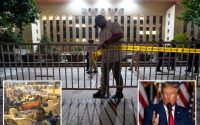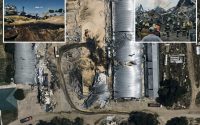US intel chief says Russia may have to shift Ukraine strategy
Russia’s military lacks the ammunition and manpower to take any significant territory from Ukrainian forces this year — turning the year-old war into a “grinding, attritional” slog, White House Director of National Intelligence Avril Haines told a Senate panel Wednesday.
“Even as the Russian offensive continues, they are experiencing high casualty rates,” Haines told the Senate Intelligence Committee. “[Russian President Vladimir] Putin is likely better understanding the limits of what his military is capable of achieving and appears to be focused on more limited military objectives for now.”
Haines added that Moscow’s forces are also beset by dysfunctional leadership and low morale — even as they appear on the verge of taking the city of Bakhmut in the eastern Donbas region.
Hours after NATO Secretary-General Jens Stoltenberg told reporters in Stockholm that Bakhmut may fall “in the coming days,” Haines told lawmakers that Russian forces were making “incremental progress” in the city, which she added was not a “particularly strategic objective.”


According to the intel boss, Putin could be forced to once again boost his military’s manpower or look beyond Russia’s borders for vital materiel.
“If Russia does not initiate a mandatory mobilization and identify substantial third party ammunition supplies, it will be increasingly challenging for them to sustain the current level of offensive operations in the coming months,” Haines said.
“And consequently, they may fully shift to holding and defending territories they occupy,” she continued. “In short we do not foresee the Russian military recovering enough this year to make major territorial gains.”


The hearing was timed to the release of the intelligence community’s annual worldwide threat assessment, which said Russia would pose “will remain a formidable and less predictable challenge to the United States in key areas during the next decade but still will face a range of constraints.”
The report added that though Russian forces “continue to concentrate on the Donbas, they probably will not be able to take all of it in 2023.” However, it also warned that further military failures could result in an erosion of backing for Putin, leading him to potentially “trigger additional escalatory actions … in an effort to win back public support.”


